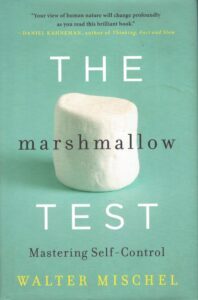Mischel Tests Patience

Walter Mischel. 2014. The Marshmallow Test: Measuring Self-Control. New York: Little, Brown, and Company.
Review by Stephen W. Hiemstra
Brazilians that I have known had a cheeky and ironic expression: Brazil is the country of the future and always will be. The idea is that patience is a virtue, but it is not the only thing required to succeed: Hard work and prudent risk-taking is also required. For those not gifted with a patient heart, the future always disappoints.
Introduction
Walter Mischel’s book, The Marshmallow Test: Measuring Self-Control, explores the mystery of patience among four-year olds. Those willing to forgo a single treat now in deference to two in twenty minutes are substantially more likely to succeed in life even years later/ Mischel reports:
“The more seconds they waited at age four or five, the higher their SAT scores and the better their rated social and cognitive functioning in adolescence. At age 27-32, those who had waited longer during the Marshmallow Test in preschool had lower body mass index and a better sense of self-worth, pursued their goals more effectively, and coped more adaptively with frustration and stress.” (3)
These impressive results at an early age suggest that patience is a valuable characteristic that can presumably be taught. Mischel’s book explores how these findings correlate with other studies and with efforts to teach patience: The stakes could hardly be higher.
Background and Organization
Walter Mischel (1930–2018) received his bachelor’s and master’s degrees from New York University and a doctorate in clinical psychology from Ohio State University. Born to a Jewish family in Austria, the family fled the Nazis in 1938 and settled in New York. Mischel taught at the University of Colorado, Harvard, and Stanford before setting into the Department of Psychology at Columbia University.
Mischel writes in twenty chapters divided into three parts:
PART I: DELAY ABILITY: ENABLING SELF-CONTROL
The Stanford University’s Surprise Room
How They Do It
Thinking Hot and Cold
The Roots of Self-Control
The Best-Laid Plans
Idle Grasshopper and Busy Ants
Is It Prewired? The New Genetics
PART II: FROM MARSHMALLOWS IN PRE-K TO MONEY IN 401K
The Engine of Success: I Think I Can!
Your Future Self
Beyond the Here and Now
Protecting the Hurt Self: Self-Distancing
Cooling Painful Emotions
The Psychological Immune System
When Smart People Act Stupid
If-Then Signatures of Personality
The Paralyzed Will
Will Fatigue
PART III: FROM LAB TO LIFE
Marshmallows and Public Policy
Applying Core Strategies
Human Nature (vii-viii)
These chapters are followed by acknowledgments, notes, and an index.
The Mechanics of Patience
Mischel did not just observe that some kids are more patient than others, he wanted to know why and how. In observing the kids taking the Marshmallow Test, he writes:
“Some covered their eyes with their hands, rested their heads on their arms to stare sideways, or. Turned their heads away to completely avoid facing the rewards … Successful delayers created all sorts of ways to distract themselves and to cool the conflict and stress they were experiencing.” (30-31)
Clearly, the mind’s picture of a temptation matters in resisting the temptation. Mischel writes:
“Facing pictures of the rewards, the children delayed 18 minutes on average—but when whey pretended that the real rewards, rather than the pictures, were in front of them, they waited less than six minutes.” (33)
Such comments remind me of a successful diet loss of thirty pounds that I experienced in 2021. Instead of saying to myself that I was hungry, I would tell myself that I was not hungry and think of how my running time would improve if I lost ten more pounds. Positive self-talk was an important component of my dieting strategy.
Mischel linked mental strategies to two different parts of the brain. The limbic system focused in the amygdala responds to hot, concrete stimuli and raw emotions while the prefrontal cortex system coolly and abstractly plans future actions (43-46). Successful strategies to develop patience work to cool emotions and focus on abstract future benefits. Stress and vivid images of rewards both undermine a cool response to temptation.
Assessment
Walter Mischel’s book, The Marshmallow Test: Measuring Self-Control, is a fascinating review of the research and applications surrounding the development of patience in early childhood and beyond. Anyone interested in helping kids grow into productive adults should find this book both accessible and interesting. For me, it was a holiday read well worth the time.
Footnotes
https://en.wikipedia.org/wiki/Walter_...
Mischel Tests Patience
Also see:
The Who Question
Preface to a Life in Tension
Other ways to engage online:
Author site: http://www.StephenWHiemstra.net
Publisher site: http://www.T2Pneuma.com
Newsletter at: https://bit.ly/X-Mas2022 , Signup
The post Mischel Tests Patience appeared first on T2Pneuma.net.



